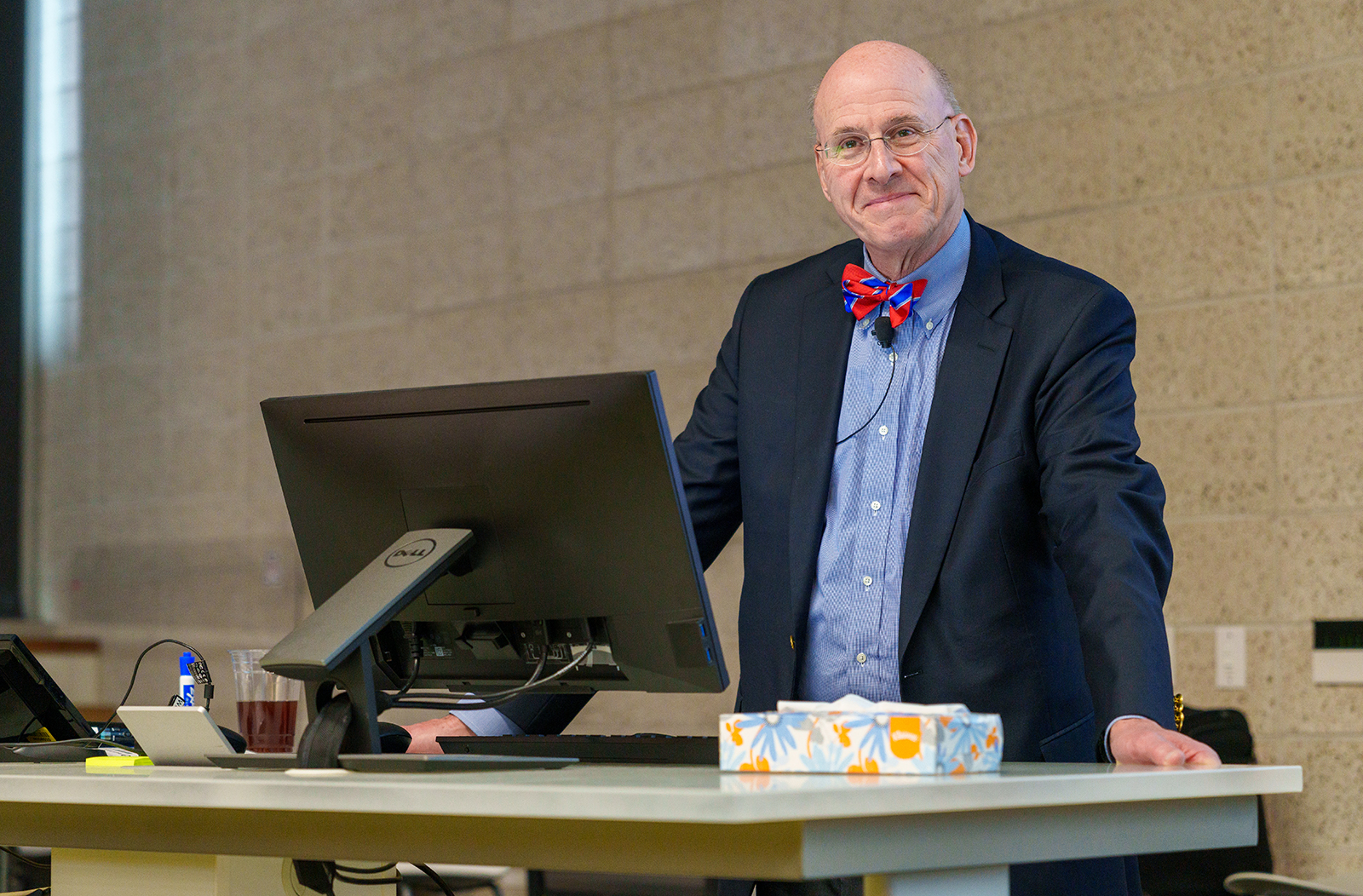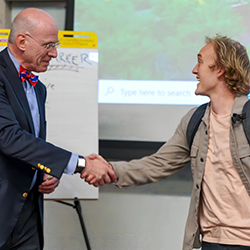
Crafting Your Ideal Career and Legacy in Medicine

James Stoller, MD, MS, hosted a series of talks for the University of Arizona College of Medicine – Phoenix and clinical partners as part of the Buffmire Lecture series sponsored by a grant from the Flinn Foundation.
Dr. Stoller’s talk on campus employed backcasting to invite each person to frame the vision for what their career in medicine will be. Backcasting is a strategic planning method that helps create ideal future scenario and then works backward to determine what is needed to achieve that goal.

“There’s a lot of things in health care that challenge optimism and could invite cynicism or skepticism,” Dr. Stoller said. “Having an intentional commitment to being resilient is very important.” The lecture continued with advice on building strong networks. Dr. Stoller emphasized that every physician at one point will need help or advice.
“One of the beauties of being in academic medicine is we have a deep passion about paying forward,” Dr. Stoller said. “The highest form of compliment that you could pay to a senior person is going to their office and saying, ‘Would you coach me to be a mentor?’”
To avoid burnout and continue the path of a prolific and fulfilling career, Dr. Stoller recommended to the physicians listening that they take time out for themselves.
“Be committed to professionalism, be organized and have ritualized timeouts for yourself,” Dr. Stoller said. “Passions of mine, I run marathons, I love to cycle, I love to fly fish and I take every vacation allotted to me.”
Ty Duffy, a first-year medical student at the college, said that for him the biggest takeaway from the lecture was the importance of being intentional and embracing serendipity in everyday life.
“A lot of times, we get so caught up in everything that we have to do that we fail to build time for introspection,” Duffy said. “Taking time for yourself when too much is demanded of you externally is very important.”
In a joint grand rounds presentation, “Developing Health Care Leaders”, Dr. Stoller focused on the leadership competencies that are essential to meet the challenges in health care today. Better patient outcomes depend on the quality of teamwork and collaboration among their care teams.
Dr. Stoller discussed how valuable teamwork is when it comes to health care and navigating the silo mentality that often exists in health care environments.
He cited research in which interprofessional, team training was provided to health care professionals in an emergency department.
“The prevalence of errors in the emergency room was significantly lower among those team-trained groups than the control groups,” Dr. Stoller said. “I’m not aware of a single paper that disputes the notion that teamwork is associated with better outcomes.”
Dr. Stoller provided additional research supporting g the importance of emotional intelligence in health care. When chairs of academic psychiatry departments were asked about characteristics associated with their success, the top-rated traits were interpersonal communication, the ability to inspire and lead by example, integrity, altruism and perseverance.
Additionally, Dr. Stoller provided tips on leadership development and emphasized the importance of offering leadership development training for providers.
"When you’re recruiting talent, you will insist on being in an environment that encourages and allows personal growth and development,” Dr. Stoller said. “As you master your clinical skills, you will have an increased appetite to develop new challenges, which organizations must recognize in order to retain talent.”
The joint grand rounds was attended by more than 175 students, residents and clinicians from the Departments of Surgery, Internal Medicine, Endocrinology and Obstetrics and Gynecology.
Dr. Stoller is the chair of the Education Institute and holds the Jean Wall Bennett Professorship in Emphysema Research at the Cleveland Clinic. He graduated from Yale University School of Medicine and completed his residency in internal medicine at Peter Bent Brigham Hospital in Boston.
A prolific diplomate in internal medicine and pulmonary disease of the American Board of Internal Medicine, Dr. Stoller has authored more than 15 books, 86 chapters, 377 peer-reviewed reports and 136 abstracts.
The college hosts the Buffmire Lecture series in partnership with the Flinn Foundation to bring national leaders in the science and art of medicine to Arizona so they may share their expertise with students, residents, clinicians, faculty and partners to improve health care.
Named for Donald K. Buffmire, MD, the lectureship recognizes his distinguished career as a medical practitioner in Arizona as well as his leadership role with the Flinn Foundation in supporting the College.
About the College
Founded in 2007, the University of Arizona College of Medicine – Phoenix inspires and trains exemplary physicians, scientists and leaders to advance its core missions in education, research, clinical care and service to communities across Arizona. The college’s strength lies in our collaborations and partnerships with clinical affiliates, community organizations and industry sponsors. With our primary affiliate, Banner Health, we are recognized as the premier academic medical center in Phoenix. As an anchor institution of the Phoenix Bioscience Core, the college is home to signature research programs in neurosciences, cardiopulmonary diseases, immunology, informatics and metabolism. These focus areas uniquely position us to drive biomedical research and bolster economic development in the region.
As an urban institution with strong roots in rural and tribal health, the college has graduated more than 1,000 physicians and matriculates 130 students each year. Greater than 60% of matriculating students are from Arizona and many continue training at our GME sponsored residency programs, ultimately pursuing local academic and community-based opportunities. While our traditional four-year program continues to thrive, we will launch our recently approved accelerated three-year medical student curriculum with exclusive focus on primary care. This program is designed to further enhance workforce retention needs across Arizona.
The college has embarked on our strategic plan for 2025 to 2030. Learn more.